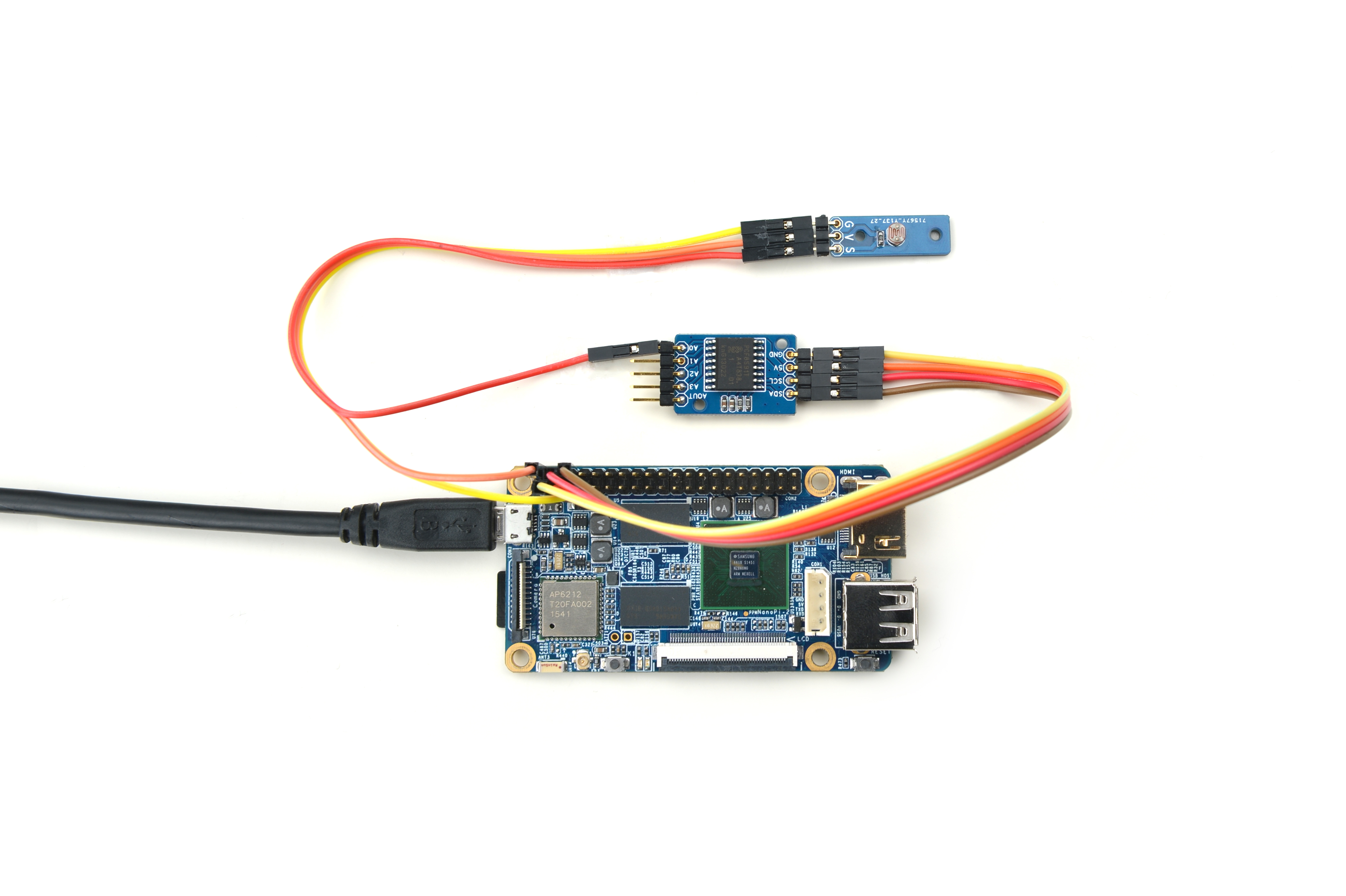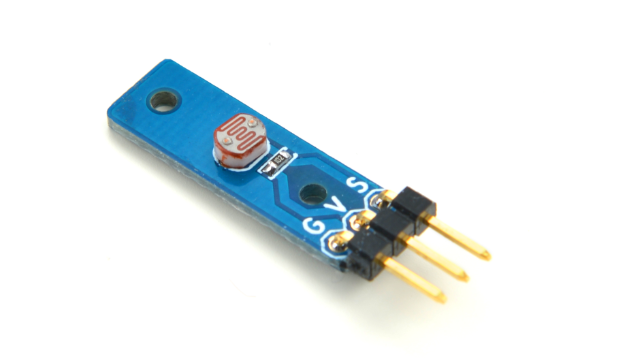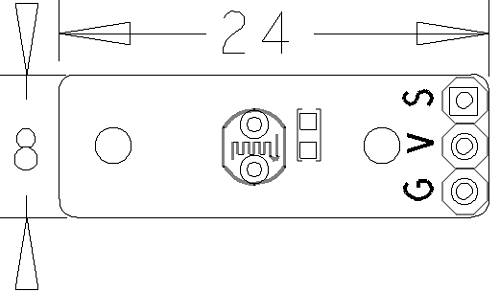Matrix - Photoresistor
Contents
1 Introduction
- The Matrix-Photoresistor is a photoresistor module. It has a 3 pin 2.54mm spacing pin-header of which V is supply voltage, G is ground and s is output analog signal. The output signal decreases with increasing incident light intensity. Users can convert its output analog signal to a digital signal via ADC conversion.
- Output Voltage: 0 ~ Vcc
2 Features
- GPIO 3.3/5V
- Small
- 2.54mm spacing pin-header
- PCB Dimension(mm): 8 x 24
- Pin Description:
| Pin | Description |
| S | Analog GPIO |
| V | Supply Voltage 5V |
| G | Ground |
3 Basic Device Operation
- The module has a photoresistor. The resistance of a photoresistor decreases with increasing incident light intensity; in other words, it exhibits photoconductivity.If incident light on a photoresistor exceeds a certain frequency, photons absorbed by the semiconductor give bound electrons enough energy to jump into the conduction band. The resulting free electrons (and their hole partners) conduct electricity, thereby lowering resistance.
4 Download Matrix Source Code
All the matrix modules' code samples are open source. They are maintained on GitHub: https://github.com/friendlyarm/matrix.git
Each branch in this hub contains the matrix modules' code samples for a board that the matrix modules can work with.
- The nanopi branch contains the matrix modules' code samples for the NanoPi
- The nanopi2 branch contains the matrix modules' code samples for the NanoPi 2
- the tiny4412 branch contains the matrix modules' code samples for the Tiny4412
- the raspberrypi branch contains the matrix modules' code samples for the RaspberryPi
Please follow the steps below to get the source code
Install the git utility on a PC running Ubuntu14.04
$ sudo apt-get install git
Clone the matrix code from GitHub
$ git clone https://github.com/friendlyarm/matrix.git
If this is successful a "matrix" directory will be generated, which will contain all the matrix modules' code samples.
5 Connect to NanoPi 2
5.1 Hardware Connection
Please refer to the following connection diagram to connect the Matrix-Photoresistor to the NanoPi 2:

Connection Details:
| Matrix-Analog_to_Digital_Converter | NanoPi 2 |
| SDA | Pin3 |
| SCL | Pin5 |
| 5V | Pin4 |
| GND | Pin6 |
| Matrix-Photoresistor | |
| GND | NanoPi 2 Pin9 |
| 5V | NanoPi 2 Pin2 |
| S | Matrix-Analog_to_Digital_Converter A0 |
This module's output signals are analog signals. You can use our Matrix-Analog_to_Digital_Converter to convert them to digital signals.
Please connect the Matrix-Analog_to_Digital_Converter to the NanoPi 2 and then connect Pin S of the Matrix-Photoresistor's pin header to Matrix-Analog_to_Digital_Converter's A0.
For more details about the Matrix-Analog_to_Digital_Converter module please refer to wiki:Matrix_-_Analog_to_Digital_Converter.
5.2 Compile Test Program
Please login the matrix hub and enter the nanopi2 branch
$ cd matrix $ git checkout nanopi2
Compile the Matrix code
$ make CROSS_COMPILE=arm-linux- clean $ make CROSS_COMPILE=arm-linux- $ make CROSS_COMPILE=arm-linux- install
Note: please make sure to install the cross compiler "arm-linux-gcc-4.9.3" on your PC, which is used to compile files for the NanoPi 2.
Generated library files are under the "install/lib" directory. The test program is under the "install/usr/bin" directory.
The modules are under the "modules" directory. Its driver's source code is in https://github.com/friendlyarm/linux-3.4.y.git
5.3 运行测试程序
将带有Debian系统的SD卡插入一台运行Linux的电脑,可以挂载SD卡上的boot和rootfs分区。
假设rootfs分区的挂载路径为/media/rootfs,执行以下命令将Matrix的硬件驱动、库文件和测试程序拷贝到NanoPi 2的文件系统上。
$ cp modules /media/rootfs/ -r $ cp install/lib/* /media/rootfs/lib/ -d $ cp install/usr/bin/* /media/rootfs/usr/bin/
将SD卡重新插入NanoPi 2,上电启动,在Debian的shell终端中执行以下命令加载硬件驱动。
$ cd /modules $ insmod pcf8591.ko
运行模块Matrix-Photoresistor的测试程序。
$ matrix-adc5.4 代码展示
int main(int argc, char ** argv) { int i = 0; int value = 0; int channel = 0; if (argc == 2) { channel = atoi(argv[1]); } for (i=0; i<ADC_READ_TIMES; i++) { if (pcf8591Read(channel, &value) != -1) { printf("channel%d value=%d\n", channel, value); } else { printf("Fail to get channel%d value\n", channel); } usleep(10000); } return 0; }


